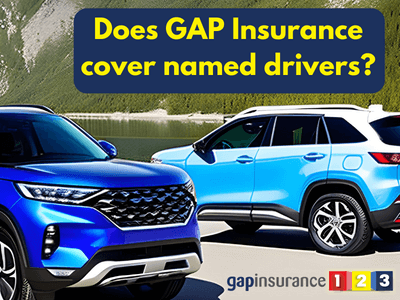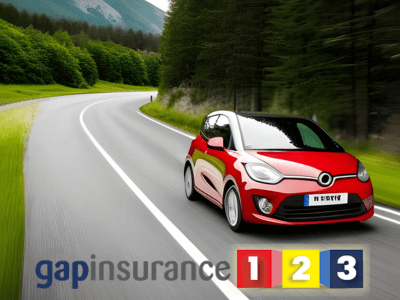Call Monday-Friday 9am - 6pm Closed Saturday & Sunday
Please select some policies.



Need Help? Calling from a mobile please call 0151 647 7556
0800 195 4926 / 0151 647 7556Do you have a question? or need help?
Call Monday-Friday 9am - 6pm Closed Saturday & Sunday,
Navigating the world of GAP Insurance can feel like a maze, especially when it comes to understanding the specifics of your policy. As one of the longest-standing GAP Insurance brands in the UK, at GAPInsurance123, we have been asked thousands of queries by people looking to buy GAP Insurance over the years.
One key question that comes up time after time is, 'Does GAP Insurance cover all drivers?'
Here we explain how GAP Insurance (also known as Guaranteed Asset Protection) works in response to this vital aspect.
Who is Covered by GAP Insurance?
Scenarios where GAP Insurance applies
GAP Insurance and named drivers
GAP Insurance exclusions regarding who is covered
Let's cut to the chase.
GAP Insurance extends its coverage to any named driver on the car insurance policy. 
This means that whether it's you, your spouse, a family member, or a friend who is a named driver on your policy, GAP insurance provides financial protection in the event of a total loss claim.
It's important to note that a 'named driver' refers to anyone listed on your car insurance policy. This could be someone who shares the car with you regularly, like a spouse or a parent, or someone who uses the car occasionally, like a friend or a sibling.
However, there are a few caveats to the question of named drivers, and we will cover these for you.
It is essential to understand where and when GAP insurance comes into play.
GAP Insurance can be used to top up your motor insurance settlement following your car being declared a total loss. This total loss declaration can follow several types of incidents, including:
In these circumstances, your car insurance settlement may only be for the car's market value at the time of the incident. Your GAP Insurance can top up this settlement to help you pay off an outstanding finance balance, recover the original price paid for the car or even help you pay for a replacement vehicle.
GAP Insurance can be beneficial for new or used car buyers. Depending on the type of cover taken, it can also assist with cars owned outright (cash buys), cars taken on finance agreements or a lease.
GAP Insurance is an optional additional cover to add to the fully comprehensive settlement from your motor insurer following a total loss claim.
To understand which drivers may be covered by your GAP Insurance policy, we need to look at your main motor insurance protection.
The GAP Insurance cover the following from your motor insurance cover:
The Policyholder - The main insured person on your motor insurance would be covered by the GAP Insurance.
Named Drivers - additional drivers named and listed to drive the vehicle on the motor insurance document.
Essentially your GAP Insurance cover is designed to follow your car insurance provider regarding who is covered. That would be the main insured person, i.e. the policyholder, and any named drivers. 
However, some crucial points must be made regarding this, including:
Scenario 1: Brand new car purchase, named driver using the car when it is in an accident and written off
Will the GAP Insurance cover this?
In this case, there should be no issue with making a GAP Insurance claim. Suppose the primary motor insurer covers the driver, a market value settlement is made, and the driver has adhered to the GAP Insurance terms and conditions. In that case, a claim should be successful.
Scenario 2: Used car purchase, a named driver who was added to the motor insurance after the car and the GAP Insurance was taken out. The vehicle is stolen and written off.
Will the GAP Insurance cover this?
Again, provided the motor insurer pays out as expected and the GAP Insurance terms have been met, a claim for this situation should not be a problem. The fact that the named driver was added after the vehicle and GAP Insurance purchase does not cause any particular issues. A claim should be acceptable as long as the driver is fully comprehensively insured on the primary insurance at the time of the incident.
Scenario 3: New car purchase, a driver used the vehicle and the motor insurance on their vehicle allows them to drive any other car.
Will the GAP Insurance cover this?
No. The driver is not named on the main motor insurance policy covering the vehicle. Also, the GAP Insurance policyholder is unlikely to be named on the other person's insurance either. The further issue is that the motor insurer the driver has on their car may well allow them to drive another vehicle not owned by them. However, the cover is, more often than not, only the basic third party only.
This combination of events means that the driver will not be fully comprehensively insured. Therefore any accident, fire or theft will not see a market-value settlement from the primary motor insurer.
Scenario 4: Used car purchase, a named driver on a motor trade policy suffers an accident. The motor insurance settlement is for the trade value.
Will GAP Insurance cover this?
No. The named driver uses the vehicle under a fully comprehensive motor insurance policy. However, they are only covered for the trade value if the car is written off, not the full market replacement value. Also, most GAP Insurance policies will exclude cover connected to the motor trade.
1. Coverage for Named Drivers: GAP insurance extends its coverage to any named driver on the car insurance policy. This includes the policyholder, family members, or friends listed as named drivers.
This is subject to the main motor insurance policy paying the market value in settlement and the other GAP Insurance terms being met.
2. Protection in Case of Total Loss: GAP insurance provides financial protection in the event of a total loss claim, regardless of who the named driver was at the time of the incident.
3. Complement to Standard Car Insurance: GAP insurance is an addition to standard car insurance, not a replacement. It provides coverage for scenarios standard car insurance may not fully cover, such as the financial gap when a car is written off or stolen. For GAP Insurance to work, your car insurance provider must write off the vehicle first.
4. Understanding the Policy: It's crucial for all drivers covered under the policy to understand the terms of GAP insurance, including when the coverage applies and its limitations.
5. Consultation with Professionals: Before adding named drivers to a GAP insurance policy, it's recommended to consult with an insurance expert in the field, like GAPInsurance123, to understand the implications and benefits thoroughly.

Yes, you can typically add GAP insurance after purchasing your car. However, some providers may restrict how long you can add it after the purchase, so it's best to check with your insurance company. With GAPInsurance123, it may be up to 180 days, for example.
Yes, GAP insurance applies regardless of who is at fault in an accident. Suppose your car is deemed a total loss. In that case, GAP insurance covers the difference between the car's current market value and, depending on which type you have, the amount you owe on your finance agreement or lease, the original price you paid for your car or the replacement cost.
GAP insurance typically only covers named drivers on the car insurance policy. If an unnamed driver is involved in an accident, the GAP insurance may not apply.
The duration of GAP insurance can vary depending on your policy and provider. Typically you can purchase GAP Insurance for between a one and five year period.
Yes, you can usually cancel your GAP insurance. If you've paid for your policy upfront, you may be entitled to a refund for the remaining coverage, depending on your provider's terms and conditions.
Yes, one of the primary purposes of GAP insurance is to cover negative equity. GAP insurance can cover the difference if your car is a total loss and you owe more on your loan or lease than the car's current market value.
GAP insurance is typically transferable to a new vehicle. If you get a new car, you can look to transfer cover, or if it suits your needs better, get a new policy for the term required.
There are several types of GAP cover available. All should work in the same way regarding the drivers they cover. All should cover any driver named, or the principal insured, on the motor insurance policy at the time of your GAP Insurance claim.
The different types of GAP Insurance this would apply to include:
This is a decision for you to make. The benefits of GAP cover for your insured vehicle are clear. GAP Insurance cost is not too much compared to what you pay for your car insurance provider's annual premium. However, GAP products are not compulsory. The decision whether you take GAP cover or not is just for you to make.
Published 24/5/23, written by Mark Griffiths